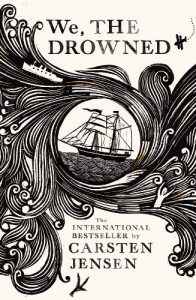 It’s been a year full of Meh so far and it took a long time coming, but I have finally, finally read a book that I absolutely loved. I’ve just finished it and I’m left breathless, barely able to contemplate that it’s over.
It’s been a year full of Meh so far and it took a long time coming, but I have finally, finally read a book that I absolutely loved. I’ve just finished it and I’m left breathless, barely able to contemplate that it’s over.I picked this book up because of its pretty blue cover that attracted me straight away. Perhaps it was fate that lead me to this book as I hadn’t heard of the title or author before. I had a certain ‘feeling’ the moment I picked it up and a little part of me knew. So often little whimsical decisions like that have lead me to books I end up loving.
It is the best book I have read all year and possibly, one of my favourite ever books – and I’m not really one who loves a book easily. When I fall, I fall hard. I feel like this book became an extra skin, something that I have lived in and has become part of me. Now that it’s over I feel bereft – like I have lost something close and special to me.
Essentially, it is the story of the town – Marstal and it is told from the collective plural ‘we’ that belongs to all the men of Marstal who went to sea. The ones who lived and returned to land, and the ones who drowned at sea. Mostly I think it is of those who drowned.
One of the things I really enjoyed about this book was reading from a different perspective. Denmark is no longer just a place for yummy pastries or bacon, it is home to a great book. I’ve been watching a lot of great Danish movies lately as well, so I have developed a little bit of an obsession.
Denmark was neutral during both wars and it was quite interesting to read a book from this perspective rather then from a side that was actively at war. Especially the parts during the second world war which had some of the most evocative images I have read in a long time.
It is a character-driven book that spans one hundred years and three generations of Marstal sailors. With almost 700 pages to fill, I don’t recount a slow moment. It isn’t an all-action book but there is always something happening that keeps the story going and the pages turning.
There is something of a legend in the way it is told. It begins with the story of Laurids Madsen’s boots and how they saved his life. Stories like these are passed down from father to son until they become legendry for the inhabitants of Marstal.
Marstal is known for it’s seafaring history and the author was inspired by many of the tales that the present residents had to tell – many that have been passed down through the generations like what happens in the book. He is himself a native of Marstal.
The translation I think was really good – or as much as I can tell in that it had a definite sense of style and voice. One of my favourite scenes that was so beautifully written was about a swarm of butterflies that had been blown across the ocean onto the ship.
It isn’t important to have an interest or a knowledge in seafaring or seafaring history. Unlike Patrick O’Brian’s Master and Commander series, it doesn’t tie you up in knots, or get you confused with all the different ropes and rigging. However, I did enjoy it a lot because I live in a busy harbour town where ships and sailing has been an important part of local heritage.
Carsten Jenson is I think a magnificent storyteller. It’s a brilliantly balanced story told in a unique voice and sense of style. It’s great to find a book that has a good balance between good writing, a good story and good characters.
It is certainly up there with my all time favourites. Perhaps not quite as high as Shogun by James Clavell (for those of you who I haven’t attacked yet: drop what you’re reading and go read that book now!) but definitely up there. We, the Drowned swept me away and I recommend it from the tips of my toes.


